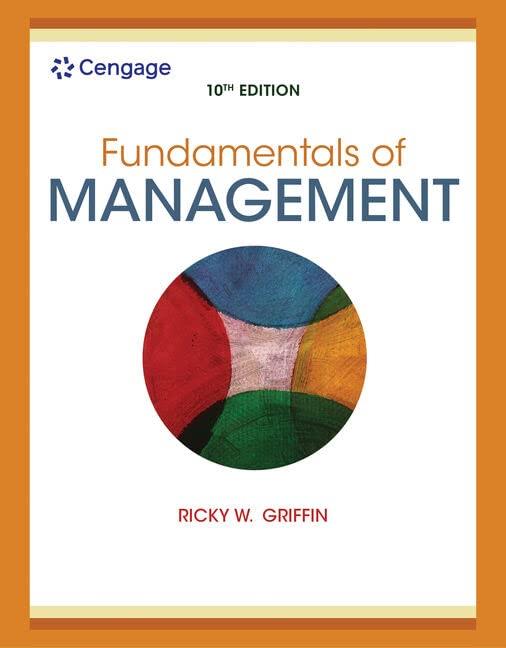For the past several years Sergey Brin and Larry Page have been running one of the worlds
Question:
For the past several years Sergey Brin and Larry Page have been running one of the world’s largest technology companies. They have named their enterprise Alphabet because they felt that it held a dual meaning, both as a collection of letters that represent language and as a reference to the investment term alpha (returns above a benchmark). The two met at Stanford University in 1995, where they were graduate students in computer science. At the time, Page was working on a software-development project designed to create an index of websites by scouring sites for key words and other linkages. Brin joined him on the project, and when they were satisfied that they’d developed something with commercial value, they tried to license the technology to other companies like Yahoo! and Microsoft that had developed and were promoting search engines. As luck would have it, though, they couldn’t find a buyer and settled instead for procuring enough investment capital to keep refining and testing their product.
In 2000, Brin and Page ran across the description of a marketing-based business model that relied on the concept of selling advertising in the form of sponsored links and search-specific ads. They adapted it to work with their own technologies and launched a new business they named Google. Google grew rap idly and after a short time became the world’s most popular search engine. But their ambitions and innovations didn’t stop there. As their revenues grew they next went on an aggressive buying spree and in short order they had purchased more than 200 companies. Among the most notable were businesses such as Android, YouTube, and DoubleClick. One thing they were committed to, though, was that all of their acquisitions had to be consistent with their original mission: to organize the world’s information and make it universally accessible and useful.
At first, Brin and Page tried to integrate their various acquisitions into the Google organization itself. They soon realized, though, that each acquisition and attempted integration just made the existing structure more and more unwieldy. It also made it hard to measure the success of each individual enterprise. So, in late 2015 they decided they needed to figure out a new way of doing things and soon came up with a solution. They formed a new company called Alphabet and made Google the largest business within the new corporate struc ture. Each of the other major enterprises were set up as their own stand-alone businesses within the Alphabet umbrella, while smaller ones were grouped together. The plan, though, was that as these smaller enterprises grew, they might also be pulled out as a stand-alone Alphabet division.
The two co-founders redirected their own efforts to running Alphabet and turned the helm of Google itself over to an up-and-coming star manager named Sundar Pichai. By the end of 2019, the company was generating more than $160 billion in revenues and that year posted profits of $34 billion. Alphabet also employed 119,000 employees. Google, its major subsidiary, provided over 80 percent of the world’s search market. In December 2019 Brin and Page announced that at the end of 2020 they would step down and simply become “employees” while remaining on the board and retaining their majority ownership of the firm. They also announced that Pichai would be elevated to serve as CEO of Alphabet.
How did two young computer scientists build this astoundingly successful company, and where will they take it in the future? Brin and Page have been remarkably successful in attracting talented and creative employees, like Pichai, and pro viding them with a work environment and culture that foster the kind of productivity and innovation for which they were hired. They’ve also remained in the forefront of Alphabet’s search for technological innovations, but nobody knows for sure what Brin and Page have on the drawing board. In fact, outsiders—notably potential investors—often criticized Alphabet, in general, and Google, in particular, for being a “black box” when they want a few more details on the company’s long-range strategy. “We don’t talk about our strategy,” explains Page, “… because it’s strategic. I would rather have people think we’re confused than let our competitors know what we’re going to do.”
Indeed, the lack of transparency was also a catalyst for creating Alphabet. But critics argue that if this was a goal, they missed the mark. Alphabet’s semi-secret research facility “X,” also known as the “moonshot factory,” has its own web site and is currently working on self-driving cars and trucks, fuel from seawater, and other long-shot, innovative projects that may or may not pan out. If there is a long-term strategic vision, it may be simply to provide the resources and freedom to some of the best and brightest dreamers in the world, and then to let their ideas develop into the reality of the future.
Case Questions
1. In your judgement, why has Google (and Alphabet) been so successful? Discuss their activities most clearly related to strategy formulation and strategy implementation.
2. Describe the corporate and business strategies illustrated in this case. Do these companies seem to be relying more on deliberate or emergent strategies?
3. Develop a SWOT analysis for Alphabet, being as specific as possible.
4. During the 2020 COVID-19 pandemic many businesses like restaurants, hotels, and movie theater chains suffered significant economic costs because they either closed or significantly reduced their operations. However, Alphabet (and Google) were not as adversely impacted. To what kinds of environmental upheavals, though, would Alphabet and Google be more susceptible? What kinds of contingency/ crisis plans might be most effective to address these?
Step by Step Answer:






